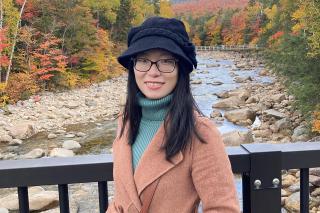This spring semester, Professor Yunxin Li is participating in the North Star Collective as a Faculty Fellow. The fellowship offers engagement opportunities for BIPOC faculty members from a variety of New England institutions. Li reflects on how the North Star Fellowship has enhanced her identity as a scholar both professionally and personally.
"The goal of the North Star Collective Faculty Fellowship is to support reparative justice and healing of junior BIPOC faculty in New England, especially faculty at teaching-focused institutions," says Professor Yunxin Li.
The fellowship, which is named after the north star that enslaved individuals would follow toward freedom, as well as the nineteenth-century abolitionist newspaper published by Frederick Douglass, was co-founded in 2021 by Simmons University's Assistant Professor of Africana Studies Tatiana Cruz and Roger Williams University's Professor of Communication and Media Studies Kamille Gentles-Peart. As Li explains, "these two brave and innovative co-founders established the Collective to connect BIPOC faculty through their shared experiences as marginalized individuals working in predominantly white institutions."
This year's cohort consists of 25 fellows from 16 institutions. (Another Simmons faculty member, Assistant Professor of Library and Information Science Rebecca Davis, is also a current North Star Fellow). "We are a unique community because we are an incredibly diverse group of people in terms of racial, ethnic, and cultural backgrounds," says Li. "We also feel connected because of our wholehearted support of one another. I think this makes us a true collective."
Li first heard about this fellowship opportunity from Cruz, and soon afterward attended the information session and decided to apply. "I felt that this would be a wonderful opportunity for me, given my background as a first-generation college graduate who was born and raised in China. I wanted to expand my network and support system as a first-year assistant professor," she explains.
Indeed, Li's personal circumstances created challenges along her academic journey. "As an Asian female and international scholar, it was not easy to complete my Ph.D. [at Stanford University] in my second language within six years and land a tenure-track position directly after that," she recalls. "I was thankful for all the people who had supported me along the way. Although my new colleagues at Simmons were extremely helpful, I needed more than one community so that I could receive different kinds of support. The North Star Fellowship sounded like it was going to be the right community for me at the right time."
North Star Fellows engage in numerous activities related to professionalization and community-building. For instance, Fellows begin with a virtual orientation, followed by a three-day retreat in North Andover. They also partake in bi-weekly virtual writing groups, an in-person colloquium, and other events. "These events are opportunities to connect with, and learn from, faculty members beyond Simmons," remarks Li.
Thus far, Li's favorite activity has been the retreat. This event was held in January at the Rolling Ridge Retreat and Conference Center, a place of tranquility and breathtaking natural beauty. During the retreat, Li says that she "made deep connections with the other Fellows. We had time to write and produce scholarship, but we also engaged in numerous socializing activities, thanks to the wonderful programming of Professors Cruz and Gentles-Peart. I appreciated the sincerity, authenticity, and openness of all the Fellows at the retreat. I not only made new colleagues, but also new friends."
The North Star Collective Fellowship helps support Li's research agenda. Currently, she is transforming her Stanford dissertation into a scholarly book. Li is an expert in early Chinese history, with a special focus on politics, society, gender, and family relations during the Han Dynasty (202 BCE-220 CE). Her book manuscript examines the inner court and power in the Han Empire. "The inner court refers to people who rose to power through their personal connections to the ruler, such as women, eunuchs, and imperial affines [relatives by marriage]. In traditional narratives, these people were seen by the literati [educated class] as illegitimate and destabilizing forces within Chinese politics."
Li's groundbreaking research challenges these pre-existing assumptions. "Instead, I would argue that imperial power worked largely through the mechanisms of spatial and emotional closeness, gender, familial relations, and social networks, as opposed to purely formal bureaucracy. So, the biased historiography was one way that members of the outer court elite competed with the inner court for political influence."
This research reveals the importance of studying marginalized groups: "Members of the Chinese inner court did not necessarily belong to the lower classes. They were comprised of individuals who were relatively powerful, but their voices were often erased from the records because the historical record was mainly written by outer court members who despised them," Li says.
Since she began the North Star Collective Fellowship, Li feels a more powerful motivation to produce scholarly writing. She is thankful for the resources the North Star Collective has afforded her, which include financial, professional, and spiritual support. "By connecting with junior faculty at peer institutions, I feel that I am not alone," says Li. "They have helped me to think about my long-term goals and have given me profound inspiration."

